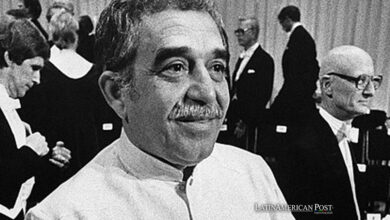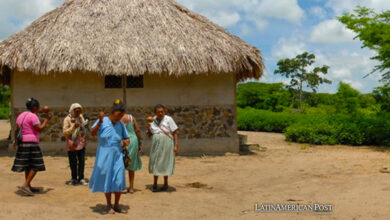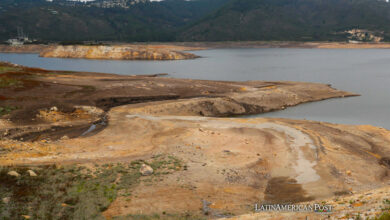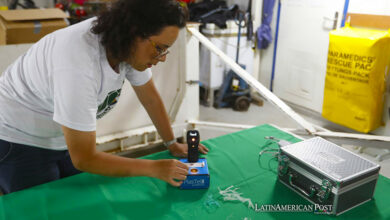This is Susana Muhamad, the New Minister of the Environment of Colombia
The Current Member of the City Council of Bogotá was chosen by the President-elect, Gustavo Petro, to Carry the Environmental Flags of his Government, Focusing on Issues such as Fracking, Mining and Socio-environmental Conflicts in that Country.

Photo: TW-susanamuhamad
LatinAmerican Post | Christopher Ramírez
Listen to this article
Leer en español: Ella es Susana Muhamad, la nueva ministra de Medioambiente de Colombia
“The doctor from Antioquia, Carolina Corcho, will be Minister of Health; the current councilor of Bogotá, a native of Barranquilla, Susana Muhamad, will be minister of the environment and the economist from Barranquilla Cecilia López Montaño will be minister of agriculture”, is the message with which the elected president of Colombia, Gustavo Petro, announced the inclusion of three new names to his ministerial cabinet in the portfolios of Health, Environment and Agriculture; all of them with extensive experience in administrative positions.
However, in the midst of the situation that Colombia is currently experiencing in environmental terms, with issues such as fracking, mining and oil extraction on the order of the day, it is important to pay close attention to Susana Muhamad, who will be in charge of dealing with the debates and controversies around these three important activities that impact the Colombian natural territory.
Who is Susanna Muhammad?
Muhamad is an environmentalist and political scientist graduated from the Universidad de los Andes in Colombia, and also has a master's degree in Sustainable Development Management and Planning from the University of Stellenbosch (South Africa).
According to the official page of the Alternative Indigenous and Social Movement (MAIS), Muhamad has put his knowledge at the service of Colombian communities, being part of "base, community and rural organizations." In addition, she has worked on issues of "Research on Human Rights and Corporate Social Responsibility in countries such as Colombia, South Africa and Denmark."
However, beyond her academic career, it should be remembered that this will not be the first time she has assumed public office in Colombia, nor will it be the first opportunity she has in executive spaces in that country.
Thanks to her work with social and environmental groups, Muhamad had the opportunity to work in the past with Gustavo Petro, assuming the role of Secretary of the Environment of Bogotá, during the Mayor's Office of the current president-elect between 2012 and 2015, under the flags of the Bogota Humana.
In this position, which she held twice (between 2012 and 2013 and then between 2014 and 2015), she made great strides in the transition to much more planet-friendly transportation, according to Muhamad's profile on the Bogotá Council's website. She worked on the policy focused on the development of the "Climate Change Plan of the city, the introduction of hybrid buses, the tender to replace Transmilenio buses with electric buses, the introduction of the electric taxi pilot, the deepening of the Policy for the protection of wetlands, the creation of the Climate Change and Risk Management Fund and the Climate Change and Risk Management Institute”, among other relevant projects for the environment of the Colombian capital.
She was also General Secretary of the Mayor's Office (between 2013 and 2014), a position in which she was able to collaborate in the defense campaign of Gustavo Petro, who at that time had been removed from his position as the first president of Bogota by the former Procurador General Alejandro Ordonez.
After the end of Petro's administration in 2015, Muhamad decided to focus on slightly more proselytizing activities within Colombia Humana, where she held the position of vice president of the National Coordination Board of said community. In addition, she participated in social projects such as Paz a la Calle and the Alianza Colombia Libre de Fracking.
Her last position before arriving at the Ministry of the Environment, where she will take office as head of this portfolio on August 7, was that of Bogotá councilor, which she held since January 1, 2020 after being elected with the endorsement of Colombia Humana in the 2019 regional elections.
You can also read: Francia Márquez: what is expected of an ecofeminist vice president?
What to expect from Susana Muhammad?
Since her inclusion in Petro's ministerial cabinet was announced, Muhamad has been clear that her banner at the head of the Ministry of the Environment will be to review which are the extractive processes that are making a stumbling block in Colombia's ecosystems.
"My cause is how we transition from an economy and culture dependent on oil to an economy and culture that reconnects again to the cycles of nature to adapt and manage to reduce the effects of the climate crisis, generating quality of life for all", said the future Environmental Ministry.
For this reason, it has always been clear that, in order to move from an energy dependent on the extraction of natural resources from Colombian soil to a much cleaner one, the first thing to do is not continue with practices typical of this reality, such as fracking . “Yes, we seek the closure of fracking. We believe that going to look for the last remnants of gas generates more harm than good," Muhamad explained in conversation with the Blu Radio station, also adding the importance of gradually moving away from other activities that are harmful to the Colombian environment, such as mining exploration and gas extraction.
Regarding mining, she stated that during the government of Gustavo Petro, activities of this caliber will not be carried out in the country's moors: “ the moor ecosystem is what generates 75 percent of the country's drinking water. What we need is to work with the peasants who are in the moors, who also arrived there displaced by the historical violence in this country. We need to work on the processes of restoration of hydrographic basins and work in depth on the maintenance of the moor ecosystem. I know that in Santurbán there are artisanal miners, you have to look at that very carefully, but opening mines in moors is absolutely inconsistent with a climate crisis logic.”
Finally, she indicated that he will pay special attention to the socio-environmental conflicts present in the country, since it is these realities that "put the lives of environmental defenders in Colombia at risk."




